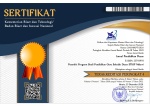PENGARUH PENDEKATAN KETERAMPILAN PROSES TERHADAP HASIL BELAJAR ILMU PENGETAHUAN ALAM (IPA) DI KELAS IV SEKOLAH DASAR NEGERI 03 NANGA PINOH
DOI:
https://doi.org/10.46368/jpd.v5i2.135Abstract
Abstract: The purpose of this research were to: (1) Find out students
learning outcome before and after been taught with process skill approach
in the class IV SDN 03 Nanga Pinoh; (2) Find out students learning
outcome before and after been taught with conventional learning method
in the class IV SDN 03 Nanga Pinoh; (3) Find out significant influence
of students learning outcome science subject used skill process approach
and conventional learning method in the class IV SDN 03 Nanga Pinoh.
This research was quasi experimental, that used Nonequivalent Control
Group Design. The research population was all students in grade IV SDN
03 Nanga Pinoh. The research sample was class IV A consist of 24
students as a experiment class and class IV B consist 23 students as a
control class. The result of research showed that: (1) The students
learning outcome before and after been taught with process skill approach
reach the averages value 30,834 and 73,75; (2) The students learning
outcome before and after been taught with conventional learning method
reach the averages value 30,435 and 33,043; (3) There was significant
influence on learning outcome of science subject used skill process
approach and conventional learning method thit > ttab, (11,837 > 2,074).
Keywords: Process Skill Approach, Learning Outcome.
Abstrak: Penelitian ini bertujuan untuk: (1) Mengetahui hasil belajar IPA
siswa sebelum dan sesudah diajarkan dengan pendekatan keterampilan
proses di kelas IV SD Negeri 03 Nanga Pinoh; 2) Mengetahui hasil
belajar IPA siswa sebelum dan sesudah diajarkan dengan metode
konvensional di kelas IV SD Negeri 03 Nanga Pinoh; 3) Mengetahui
pengaruh yang signifikan hasil belajar IPA menggunakan pendekatan
keterampilan proses dan metode konvensional di kelas IV SD Negeri 03
Nanga Pinoh. Jenis penelitian adalah penelitian eksperimen semu dengan
desain Nonequivalent Control Group Design. Populasi penelitian yaitu
seluruh siswa kelas IV SD Negeri 03 Nanga Pinoh. Sampel penelitian
yaitu kelas IV A berjumlah 24 siswa sebagai kelas eksperimen dan IV B
berjumlah 23 siswa sebagai kelas kontrol. Hasil penelitian menunjukkan
bahwa: 1) Hasil belajar IPA siswa sebelum dan sesudah diajarkan
pendekatan keterampilan proses rata-rata 30,834 dan 73,75; 2) Hasil
belajar IPA siswa sebelum dan sesudah diajarkan metode konvensional
rata-rata 30,435 dan 33,043; 3) Terdapat pengaruh yang signifikan pada
hasil belajar IPA menggunakan pendekatan keterampilan proses dan
metode konvensional thitung > ttabel (11,837 > 2,074).
Kata Kunci: Pendekatan keterampilan proses, Hasil Belajar.
learning outcome before and after been taught with process skill approach
in the class IV SDN 03 Nanga Pinoh; (2) Find out students learning
outcome before and after been taught with conventional learning method
in the class IV SDN 03 Nanga Pinoh; (3) Find out significant influence
of students learning outcome science subject used skill process approach
and conventional learning method in the class IV SDN 03 Nanga Pinoh.
This research was quasi experimental, that used Nonequivalent Control
Group Design. The research population was all students in grade IV SDN
03 Nanga Pinoh. The research sample was class IV A consist of 24
students as a experiment class and class IV B consist 23 students as a
control class. The result of research showed that: (1) The students
learning outcome before and after been taught with process skill approach
reach the averages value 30,834 and 73,75; (2) The students learning
outcome before and after been taught with conventional learning method
reach the averages value 30,435 and 33,043; (3) There was significant
influence on learning outcome of science subject used skill process
approach and conventional learning method thit > ttab, (11,837 > 2,074).
Keywords: Process Skill Approach, Learning Outcome.
Abstrak: Penelitian ini bertujuan untuk: (1) Mengetahui hasil belajar IPA
siswa sebelum dan sesudah diajarkan dengan pendekatan keterampilan
proses di kelas IV SD Negeri 03 Nanga Pinoh; 2) Mengetahui hasil
belajar IPA siswa sebelum dan sesudah diajarkan dengan metode
konvensional di kelas IV SD Negeri 03 Nanga Pinoh; 3) Mengetahui
pengaruh yang signifikan hasil belajar IPA menggunakan pendekatan
keterampilan proses dan metode konvensional di kelas IV SD Negeri 03
Nanga Pinoh. Jenis penelitian adalah penelitian eksperimen semu dengan
desain Nonequivalent Control Group Design. Populasi penelitian yaitu
seluruh siswa kelas IV SD Negeri 03 Nanga Pinoh. Sampel penelitian
yaitu kelas IV A berjumlah 24 siswa sebagai kelas eksperimen dan IV B
berjumlah 23 siswa sebagai kelas kontrol. Hasil penelitian menunjukkan
bahwa: 1) Hasil belajar IPA siswa sebelum dan sesudah diajarkan
pendekatan keterampilan proses rata-rata 30,834 dan 73,75; 2) Hasil
belajar IPA siswa sebelum dan sesudah diajarkan metode konvensional
rata-rata 30,435 dan 33,043; 3) Terdapat pengaruh yang signifikan pada
hasil belajar IPA menggunakan pendekatan keterampilan proses dan
metode konvensional thitung > ttabel (11,837 > 2,074).
Kata Kunci: Pendekatan keterampilan proses, Hasil Belajar.
Downloads
Published
2017-12-01
How to Cite
purnamasari, ice, Waridah, W., & Etiovia, R. Y. (2017). PENGARUH PENDEKATAN KETERAMPILAN PROSES TERHADAP HASIL BELAJAR ILMU PENGETAHUAN ALAM (IPA) DI KELAS IV SEKOLAH DASAR NEGERI 03 NANGA PINOH. JURNAL PENDIDIKAN DASAR, 5(2), 116–131. https://doi.org/10.46368/jpd.v5i2.135
Issue
Section
Artikel
Citation Check
License
Authors who publish with this journal agree to the following terms:
1. Authors retain copyright and grant the journal right of first publication with the work simultaneously licensed under a Creative Commons Attribution License that allows others to share the work with an acknowledgement of the work's authorship and initial publication in this journal.
2. Authors are able to enter into separate, additional contractual arrangements for the non-exclusive distribution of the journal's published version of the work (e.g., post it to an institutional repository or publish it in a book), with an acknowledgement of its initial publication in this journal.
3. Authors are permitted and encouraged to post their work online (e.g., in institutional repositories or on their website) prior to and during the submission process, as it can lead to productive exchanges, as well as earlier and greater citation of published work.  Â





